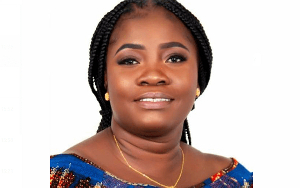 Enyonam Adzo Apetorgbor, banker & forensic investigations expert
Enyonam Adzo Apetorgbor, banker & forensic investigations expert
The foundation of any democracy rests on the legitimacy of its elections, and the integrity of those elections is deeply rooted in the credibility of the electoral register.
The right to vote is not just a civic duty but a sacred responsibility, ensuring that this register is accurate, transparent, and fair is essential to maintaining public trust in the democratic process. As we approach the December 7 election, the question of how to safeguard the credibility of the voters’ register becomes more urgent, especially in the context of our current economic and social challenges.
One of the most effective tools to guarantee the accuracy and fairness of an electoral register is a forensic audit. Unlike a routine review, a forensic audit delves deeply into the accuracy and integrity of the register, ensuring that it reflects the true demographic of eligible voters. The goal is not only to verify the data but also to uncover any potential discrepancies, errors, or fraudulent activities that may undermine the fairness of the electoral process.
Why a forensic audit of the electoral register is necessary
Enhancing Transparency: A forensic audit will demonstrate the Electoral Commission’s commitment to transparency. By subjecting the electoral register to an independent, rigorous review, the Commission would be sending a strong signal that it values openness and is willing to ensure that no eligible voter is disenfranchised while also preventing the inclusion of ineligible voters. This act of transparency would go a long way in enhancing public confidence.
Promoting Fairness: Fairness in elections cannot be compromised. A forensic audit will help ensure that every citizen who meets the legal requirements has an equal opportunity to vote. This means eliminating the possibility of double registrations, underage voting, or the inclusion of deceased persons in the register. Fairness in the electoral process ensures that each vote has equal weight, protecting the essence of democracy.
Building Public Trust: Trust is the bedrock of any functioning democracy. Given the already heightened political tensions and the economic hardships facing many Ghanaians, the electorate deserves reassurance that the process leading to the elections is above reproach. A forensic audit would help rebuild trust in the system, especially among the skeptical public who may have lost faith in the electoral process due to past concerns. By ensuring that the register is accurate and credible, citizens will have greater trust in the outcome of the election, regardless of which candidate emerges victorious.
The Electoral Commission (EC) of Ghana, under the leadership of its Chairperson, plays a pivotal role in safeguarding the sanctity of our democracy. As the custodian of the electoral process, the Chairperson must act in a manner that not only upholds the laws of the land but also reflects the highest standards of ethical leadership.
It is imperative that the Chairperson has reverence for God and governs the Commission’s activities with a moral compass. Ghana’s history is steeped in deep spiritual and religious beliefs, and the expectation of leadership is one of moral integrity and accountability. The decision to accept a forensic audit of the electoral register, especially when offered support from credible international organizations like the United Nations Development Programme (UNDP), is not a sign of weakness or capitulation, but one of strength. It demonstrates humility, wisdom, and a deep commitment to the people’s well-being.
A forensic audit, backed by external funding, strengthens the Commission’s credibility, ensuring that its work is beyond reproach. By embracing such measures, the Chairperson will secure her place in history as a leader who was willing to take all necessary steps to guarantee the fairness and transparency of the electoral process.
Ghana is currently grappling with severe economic challenges that have left many citizens in a state of financial insecurity and trauma. From the rising cost of living to the depreciation of the cedi, Ghanaians are experiencing tough times, with frustrations running high. In such an environment, it is vital that the electoral process does not become another source of stress or division.
Elections should be a time for national unity, where citizens come together to express their collective will through the ballot box. However, if the integrity of the electoral register is in doubt, it could spark unrest and further exacerbate the country’s fragile economic and social situation. The EC, therefore, has a unique responsibility to choose peace by ensuring that the electoral process is beyond reproach. The forensic audit of the voters' register is a step in the right direction toward achieving that peace.
Choosing transparency is choosing peace. The people of Ghana deserve nothing less.